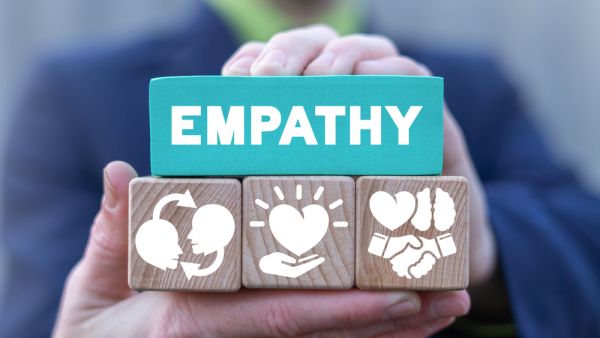We all go through challenging times, and sometimes we could use the support of loved ones. But what many people fail to see is that a huge part of this support lies in trying to understand the feelings and emotions of others. In order to do so, we need to practice empathy.
But what is empathy? And how can we integrate it in our lives?
In short, empathy is the ability to put ourselves in another person’s shoes, understand and relate to what they are going through. Empathy does not only focus on understanding a person’s thoughts and feelings, but is also used in finding the right emotional response.
According to cognitive neuroscientist and professor of Developmental Psychopathology at Cambridge University, Simon Baron-Cohen, empathy is made up of two main components. The first is cognitive empathy which has to do with recognizing the thoughts and feelings of a person, whereas the second component is affective empathy, which drives our emotional response. Baron-Cohen says that empathy is not empathy if one of these elements is not present.
But explaining and practicing empathy is much easier said than done. And what so many seem to do is mix up between sympathy and empathy. Just because words rhyme, does not mean they mean the same thing!
While empathy has understanding and recognition behind it, sympathy focuses on feeling sorry and pitying the person in front of you. The former revolves around lifting people up and holding their hands as they push through, while the latter has to do with viewing things from a limited perspective without really understanding why the other person feels this way.
There is more to empathy than just knowing what it is. One of the most important factors in developing empathy is having it instilled in us at a young. How are families view and treat other people and whether or not we are exposed to classical literature and shows that show the importance of humanity and empathy play a pivotal role in becoming empathetic.
However, not everyone was lucky enough to grow up in an environment were they know about empathy. But regardless of whether that little seed of empathy was planted in you at a young age or not, empathy can be learned! And in order to ripe the benefits of empathy, then you will need to practice it! Here are some ways you can start exercising that empathy muscle of yours:
- Talk to new people
Be curious about other people. Not in the annoying kind of way where you meddle in people’s business. But instead be curious about what they are thinking and feeling. Curiosity can be a great asset when trying to understand what the other person is feeling. In order to really empathize with the person in front of you then you will need to get inside their minds and understand how they think and feel. By exposing ourselves to people outside our circle, we are learning more about people and the world.
- Listen to understand, not just to respond
We can all fall for it sometimes. Listening to people open up only to drown them with pep talks without taking the time to understand where they are coming from. When someone opens up, you need to be an active listener. Try to engage your senses to show that you are trying to understand. Maintain eye-contact, uncross your arms and be attentive. Do not interrupt them, and ask them questions without judgement.
- Admit you’re biased
Whether we dare to admit it or not, we all have biases. While many people can recognize conscious bias and work towards erasing it, unconscious bias is not as easy to deal with. Due to the subtle nature of unconscious bias, it is important that you keep an eye out to how you unconsciously think or look at people from different races, cultures, religions or gender. Acknowledging that we are biased does not make us bad people, instead it comes to show that we are trying to change and become better humans. The more aware we are of them, the more control we can have over them.
- Stand up for others
Empathy should encourage us to be compassionate and kind towards others. Being empathetic means standing up for those who need our support and empathy. Advocate for important causes and be vocal about things that can help others others keep going.
With empathy, one cannot turn a blind eye to the pain and suffering of others, and therefore it is a driving force that helps build and maintain healthy relationships and connections. Because at the end of the day, without empathy we might lose our sense of belonging.








